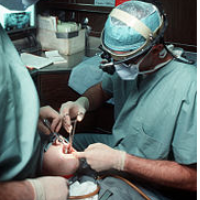Behind the $3 Billion a Year Wisdom Teeth Removal Procedure…Health or Profits?
 (photo: Wikipedia)
(photo: Wikipedia)
Having your wisdom teeth removed has long been viewed as a smart move by dental professionals. But this common recommendation has also produced considerable income for oral surgeons, raising questions whether having wisdom teeth extracted is in the patient’s best interest.
The Los Angeles Times reports that wisdom teeth removal generates about $3 billion annually in business. Of all tooth extractions performed by oral surgeons, nearly 80% are wisdom teeth, according to a sampling of claims data from Dental Delta of California.
Although a local anesthesia, such as Novocain, can be used during the procedure, oral surgeons are able to administer general anesthesia—which costs much more—to knock their patients out completely.
“They like to give general anesthetic,” Los Angeles dentist Jay Friedman, interviewed by the Times, said of oral surgeons. “It's a big money maker. You're making a lot of money giving general anesthesia or I-V sedation, even though you don't need it.”
With many dental insurance plans covering the procedure, Americans are often willing to follow through on a dentist’s recommendation to have the teeth, also known as third molars, taken out.
A survey produced by the American Public Health Association found nearly 90% of those questioned about why they had their wisdom teeth removed said it was because their insurance paid for part of the work.
Dental experts say the common reason for the surgery is the crowding of teeth as wisdom molars grow in (usually during late teens or twenties).
“But there’s disagreement about whether wisdom teeth need to come out to ease crowding — not so long ago a common reason for extraction,” wrote the Times’ Elise Oberliesen. “A 2012 Cochrane review of randomized clinical trials related to wisdom teeth looked at evidence on both sides of the debate. In its conclusion, the research team found no sufficient data to suggest that taking out wisdom teeth reduced crowding of the remaining teeth over five years.”
Other reasons for the extraction of wisdom teeth are when they only partially emerge, grow in at angle, or become infected. But pulling out healthy wisdom teeth is, say some, no different than surgically removing a healthy appendix just because it could one day burst, wrote Oberliesen.
“I don't know of any other surgical treatment still done in the United States where we prophylactically do an invasive surgical procedure unless there's pretty strong evidence supporting it,” University of Florida dentistry professor Scott Tomar told the Times. “We've abandoned that idea long ago.”
-Noel Brinkerhoff, Danny Biederman
To Learn More:
Dentists Debate Need to Extract Wisdom Teeth (by Elise Oberliesen, Los Angeles Times)
Questioning the Wisdom Behind Removing Third Molars (by Mary Otto, Association of Health Care Journalists)
- Top Stories
- Unusual News
- Where is the Money Going?
- Controversies
- U.S. and the World
- Appointments and Resignations
- Latest News
- Trump to Stop Deportations If…
- Trump Denounces World Series
- What If China Invaded the United States?
- Donald Trump Has a Mental Health Problem and It Has a Name
- Trump Goes on Renaming Frenzy






Comments